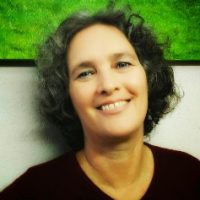“Time is an illusion, lunchtime doubly so.” – Douglas Adams
Do you, too, feel down when the world turns gray?
Or maybe you feel more than a little down, more like, say, wishing to wrap yourself up with your comforter and not come out until Apollo brings back a big hot sun?
For most of us, the darkening world takes the sting out of living, let alone doing anything. The iciness doesn’t help, either. Winter sucks every year, and this year, when things are unbearable anyway, winter feels like too much, really.
I, for one, have spent the last many weeks feeling increasingly depressed. At some point, it came to my mind that last year, and the one before and possibly always, my mood drops at this time of the year. (Naming the season “fall” suggests I’m probably not alone.) I realized that every autumn, I feel that I need an urgent vacation in some sunny place, I get pissed at my one-and-only for not taking me away from my life at once, and even the illuminated holidays of this seasons can’t bring me back to my senses.
But seasonal gloominess is not the end of the story for me. Oh, no. Every year I feel that my life is somehow fundamentally wrong. That something must be changed, but I don’t know what. Every winter, then, I find myself depressed, confused and desperate, but at least I know now that apparently, it’s temporary, and that I will go through it. In all probability.
I also realized that this winter gloom, as well as the other seasons that follow it, may have a purpose.
Our surroundings have a huge effect on our wellness. Though we think of ourselves as conscious beings, we unthinkingly absorb the lights, air, sights, sounds, and smells around us. All of these uninvited influences unconsciously affect our mood, our health, and our happiness.
As we can’t beat them, we better join them, and use them in our favor.
Winter Gloom
Winter is all about darkness, cold and water.
Yuck.
It causes us to withdraw, to shrink, to feel miserable and bewildered. We often feel as if we are not able to do anything, not even think properly. We feel like time slips through our fingers, and we identify with W.H. Auden’s words,
“You cannot conquer time.”
Luckily, like in any good movie, old Chinese sages come to our aid. Winter, they explain to us, is the most Yin period existing, and it has a vital role. This time is like a black watery uterus, which enables the creation of insights and life. It is the nursery where the seeds of our future growth germinate in the dark.
Winter is time for being, not for doing. Trying to be ceaselessly active, as the westerners feel they always should, only hinders the process.
Hardships, confusion and desperation are the keys to our ability to question what we have, leave it behind, and start groping for something else. We hardly make any change when we feel satisfied and confident. Doubts are necessary because, over time, changes are necessary.
So, we better not fight our feelings. We better take our time, stare, ponder, examine ideas and see what suits us and what doesn’t. We better listen, learn, and rummage for insights. If something seems right, we can think about it even more, check it, doubt it, maybe develop it, and maybe plan it.
We better not rush to carry anything out – we don’t have the strength for it anyway.
If nothing comes up, it’s okay, too.
We can keep dabbling.
Because it will soon be over.
Springing
When the sun bestows its beams on us, the flora and fauna bloom, and the air is filled with smells of flowering, our blood starts rushing through our veins. All of a sudden, we wish to sing, fall in love, hug trees or conquer the world, a variety of activities we wouldn’t dream of in any other season.
This is the time to notice sheepish initiatives buried in hidden corners of our hearts, and bravely give them an opportunity to see the light of day.
This is the time we have the enthusiasm and vigor to try new things. We better not be afraid, and try everything out, because the world is waiting for our improvements. As Francis Bacon wrote,
“He that will not apply new remedies, must expect new evils: for time is the greatest Innovator.”
It’s easier to try when we know that even if something doesn’t work, at least in the beginning, the world around us will still love us every spring day.
We better join the growth around, sprout, expand existing fields in new directions, grow, and live.
This is the season to give ourselves permission to try, to change, and to flourish.
Now is the time to spring.
Summer Ripening
When the light and the heat we carved reach us with all their might, frequently to the point we curse them for that, we nurture our inner sprouts and grow. However irritating the light is, it pours us the power to work, materialize, blossom, and bear our fruits.
When we work on projects close to our hearts, we normally don’t have the patience for breaks, for rests, for learning. That’s okay – now is the Yang time for doing, not for being. (Except for the warm sensual summer nights, maybe, when we can lazily take pleasure in the humid darkness, and if we are lucky – in the stars, too.)
But as the summer, the heat and our work go on, we gradually become tired. This is an excellent time for a break. Accidentally, this is also the customary time for vacations in schools and workplaces. After all of this challenging work, we deserve a rest.
If we are still vibrant, we will probably have a dynamic, energetic vacation. When we get back home, we will definitely be exhausted.
This is the time for fall.
Autumn Harvest
When the days become shorter and the light becomes scarcer, the attempt to rebuild a routine takes us a lot of effort. The reopening of schools and courses compels most of us to run around overwhelmingly between classes, in a desperate struggle not to screw everything up. When we finally manage to carry out some compromised routine, we are really worn out.
Luckily, we have already made quite a way this year, and we can start picking some of its fruits.
It’s fortunate, because we have no power left to grow any new invention whatsoever. Instead, we realize now that,
“Time slurs over everything, let all deeds fade, blurs all writings and kills all memories. Except are only those which dig into the hearts of men by love.”
As Aristotle realized a little bit before us.
So we celebrate with our loved ones, who take in our weary impatience, and provide us with catharsis, relief and comfort.
Bless their unfortunate souls.
Fortunately, we do the same for them.
Sometimes. Maybe.
After the autumnal holidays, we return to our routine unwillingly. The grayer and colder the world becomes, the more we are fed up with it, and the more we want to hide in our homes, under our comforters.
We have no energy left.
It seems like the end.
But, actually, it is a new beginning.
The Cycle Of Our Year
Our technological world deludes us into believing that we subdued nature, including our minds and bodies. People brag about getting up at dawn, or having only a few hours of sleep, as if they achieved some significant goal. As if their body was some demanding stranger who bothered them, and they’ve defeated him and now live peacefully without him.
As if.
In reality, our souls and our bodies are us. And the more we idiotically ignore them, the more painful the prices are.
Furthermore, our bodies and emotions are probably our wisest parts, so we better start listening to them.
If we listen to these misunderstood parts of ours, they can teach us to splendidly slow down, feel, and develop. Then, we will learn to make our lives a lot happier. (And longer.)
Paying attention to the ways we are connected to the world around us can help us tremendously. Noticing the ways it affects us enables us to use these effects in our favor. It reminds us that, as Anastacia sings,
“Time makes me stronger.”
So we better enlist the cycle of the year on our side.
To teach us when is the time to plant, the time to reap, the time to keep and the time to discard. Because, as Ecclesiastes says,
“To everything there is a season, and a time for every purpose under heaven.”
Paying attention to the times that work for us can help us be more creative.
More fruitful.
More happy.
So we better join forces with the powers of every season.
One season at a time.
One (in)activity at a time.
Starting now.
 Author Estee Horn comes from a long line of not-so-warty healing women. She uses their word-craft, as well as her MA in Eco-Psychology, to help people simplify life and be happier. Get her free life-changing checklist of 15 Habits That Create Happiness.
Author Estee Horn comes from a long line of not-so-warty healing women. She uses their word-craft, as well as her MA in Eco-Psychology, to help people simplify life and be happier. Get her free life-changing checklist of 15 Habits That Create Happiness.
Image courtesy of Lisa Fotios.












